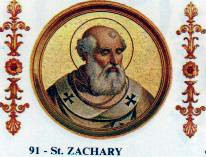Pope Zacharias
|
Pope Saint Zachary |
|
|---|---|
 |
|
| Papacy began | 3 December or 5 December 741 |
| Papacy ended | 15 March 752 |
| Predecessor | Gregory III |
| Successor | Pope-elect Stephen |
| Personal details | |
| Birth name | Zacharias son of Polichronius |
| Born | 679 Santa Severina, Calabria, Byzantine Empire |
| Died | 15 March 752 Rome, Byzantine Empire |
Pope Zachary (Latin: Zacharias; 679 – 15 March 752) reigned from 3 December or 5 December 741 to his death in 752. A Greek from Santa Severina,Calabria, he was the last pope of the Byzantine Papacy. Most probably he was a deacon of the Roman Church and as such signed the decrees of the Roman council of 732 and was on intimate terms with Gregory III, whom he succeeded on 5 December 741.
Zachary was a wise and subtle diplomat. His predecessor's alliance with the Lombard Duke of Spoleto put papal cities at risk when the Dukes of Spoleto and Benevento rebelled. Zachary turned to King Liutprand the Lombard directly. Out of respect for Zachary the king restored to the church of Rome all the territory seized by the Lombards and sent back the captives without ransom. The contemporary history (Liber pontificalis) dwells chiefly on Zachary's great personal influence with Liutprand, and with his successor Ratchis. His tact in dealing with these princes in a variety of emergencies contributed to save the Exarchate of Ravenna from the Lombard attacks.
A correspondence of considerable extent and of great interest between Zachary and Saint Boniface, the apostle of Germany, survives, and shows how great was the influence of this pope on events in France and Germany. He encouraged the deposition of the last Merovingian king of the Franks, Childeric III, and it was with his sanction that Boniface crowned Pepin the Short as King of the Franks at Soissons in 752. Zachary is stated to have remonstrated with the Byzantine emperor Constantine V Copronymus on the part he had taken in the iconoclastic controversy.
...
Wikipedia
